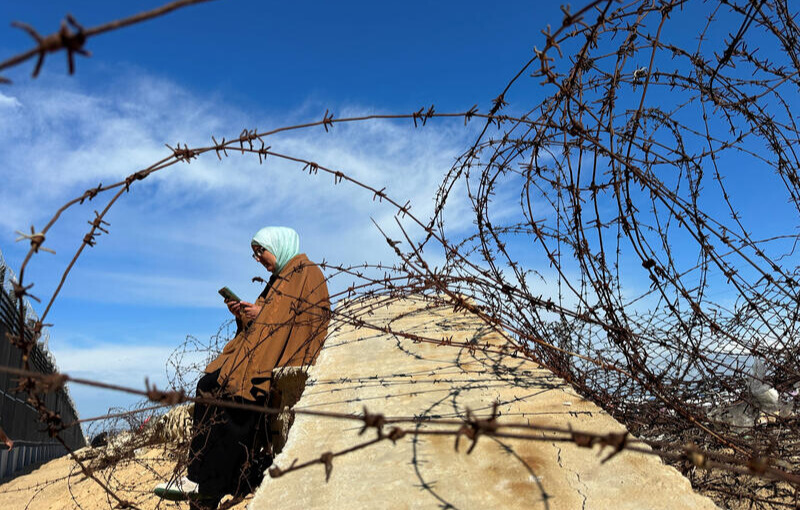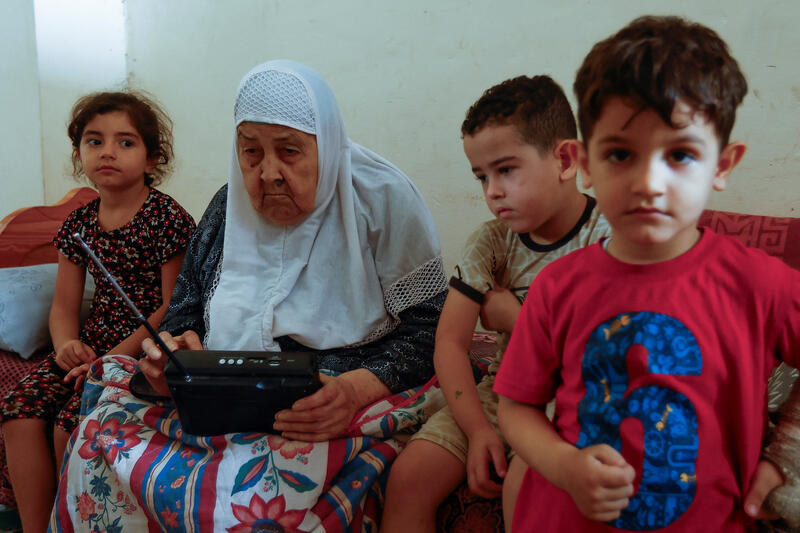Palestinians struggle to connect and get news amid digital shutdowns in Gaza: “Without the internet everything stops”

A displaced Palestinian woman tries to get internet service on her phone through the Egyptian networks to communicate with her relatives, near the border with Egypt, in Rafah in the southern Gaza Strip February 1, 2024. REUTERS/Mohammed Salem
A few metres from Gaza’s border with Egypt, Al Jazeera journalist Maram Humaid saw an 18-year-old man on a pile of sand holding planks of wood in the air, glued to which was a mobile phone.
“This is the telecommunications company of the makeshift camp,” the young man explained. He was connecting to an Egyptian internet service provider through an eSIM – a virtual SIM card allowing connection to a mobile network without a physical SIM – so other displaced people could access a hotspot. “I can’t stay disconnected, so I strive to find a solution,” Humaid recalls the young man telling her.
This is just one example of how people in Gaza are finding innovative ways to stay connected with each other in the face of Israeli attacks and internet shutdowns. I wanted to know how they have managed to stay connected and informed since October. So I spoke with Humaid as well as with Palestinian digital rights analysts and Gaza residents. They discussed the extreme challenges they’ve faced when sharing and receiving vital news in the midst of Israel’s military campaign.
“As essential as food and water”
On 9 October Israeli defence minister Yoav Gallant announced a “complete siege” of Gaza, including the withholding of fuel and electricity, severely hampering all services that relied on a steady supply of power.
Within a few weeks, Gaza’s largest telecoms provider Paltel said heavy bombardment had destroyed the last remaining infrastructure connecting the territory’s internet to the rest of the world, plunging the Strip into its first near-total blackout. According to a local expert quoted by a source at The Intercept, internet access declined by 80 to 90%.
Gaza’s residents relied heavily on the internet to communicate with each other and with authorities and NGOs. But even before the war, a severe digital divide existed.
Digital rights analyst Marwa Fatafta says Israel’s decades-long blockade has prevented technology entering Gaza that provides more than a 1990s-standard 2G connection. “It's easy [for Israel] to surveil and intercept calls and messages when they are on 2G networks,” Fatafta tells me from Hamburg.
She works as MENA Policy and Advocacy Director for Access Now, an organisation which has tracked the disruption to Gaza’s connectivity since the start of the war. Their analysis recorded multiple occasions when there has been a complete blackout, lasting from one day to an entire week.
Fatafta says Access Now has been involved in multiple crises across the world where digital shutdowns have occurred, including in Sudan, Ethiopia, Iran and Myanmar. They have always found solutions to reconnect those who fall within their mandate including journalists, civil society groups and human rights defenders. But this time it’s been much more difficult.
“In Gaza we always hit the same wall,” she says. “Israel controls every piece of technology, equipment, material, going into the Gaza Strip. The fact that whatever connects Gaza to the rest of the world – the cables run through Israel, and Israel can just kill the switch – is unacceptable at this point.”
With children in Gaza already dying from hunger and 100,000s facing famine, Fatafta acknowledges that functioning telecoms infrastructure “might not be the most pressing thing.” But she believes the internet has become “as essential as food and water in some cases for people's survival.”
She points to an incident where a tank fired on a family fleeing the North of Gaza in their car: “If you don’t know where’s the safest route for you to escape, or you don't know where the Israeli army is present and you can't verify, you just hear rumours, it can really endanger your life.”
Access Now has managed to circumvent these digital shutdowns through the use of eSIMs. The initiative was started by Egyptian activist Mirna El Helbawi and Gazan journalist Amhed El-Madhoun, who became the first eSIM user since the war started. In a recent CNN piece El Helbawi described the moment she realised these devices could work “as light at the end of a very dark tunnel.” But eSIMs do not always provide the reliable connection that Gazans so desperately need, especially when people are forced to move so frequently.
“We've helped people with eSIM cards, and sometimes they work but sometimes they don't,” Fatafta explains. “Sometimes they work for a certain period of time. But then if you relocate, as many people had to relocate multiple times, they don't work because you have to be close to either an Israeli or an Egyptian cell tower to be able to latch on to it.”
Al Jazeera’s Humaid has also seen the emergence of pop-up ‘cyber points’ where people gather to get a signal. On her way to work, she passes two of them set up by people with technical know-how for disconnected Gazans who pay hourly to get online.
“They are just engineers, they have these tricks, these unbelievable ways of digging for a solution,” Humaid says. “People here are just very innovative, and everyone has found ways to adapt to the situation and to live with the materials available around them.”

“We can’t even call an ambulance”
In a war where the Israeli army has destroyed or damaged 60% of all homes in Gaza, many residents have also lost their basic personal possessions, including devices to get them online.
Yafa Abu Aker, an independent journalist who has been displaced multiple times and who is now considering fleeing the Southern city of Rafah too, says, “I lost my house after three days [of the war] and I lost everything I need for work: my laptop, my mobile.”
For those who can access a mobile phone, the lack of electricity means charging it has become a time-consuming task alongside securing other basic essentials. Dr Ramy Morjan, a chemistry professor whose workplace at the Islamic University of Gaza was destroyed, says it takes a long time to access communal charging points, powered by car batteries, solar cells or generators.
“I spend between four to five hours getting my mobile battery charged with only 50%,” Morjan says.
The lack of reliable phone connections has proven a life or death scenario for many in Gaza, says Hamza Ibrahim, an English-language teacher and contributor to the website We Are Not Numbers, over a brief WhatsApp exchange. “We can't even call an ambulance. We use a horse cart to get the dead or injured into the hospital,” he says.
Phone services are further stretched due to Gaza’s population being ever more concentrated, particularly in the South. Rafah’s population, for example, has grown at least five-fold since the start of the war. “Even when the services are on, because of the load on the network, it's really hard to connect,” Fatafta says.

“Radio now is the easiest way to get news”
Because of the restrictions to online connectivity, Morjan says the internet is no longer the first option for getting the vital information Palestinians need to manage their daily lives. Many are turning to radio instead to find crucial information about humanitarian deliveries in the Gaza.
“National and international radio stations have their correspondents who keep monitoring and reporting the entry of aid into Gaza through the Rafah border,” he says. Al Jazeera provides a radio version of its television stream while the BBC in November launched an Emergency Radio Service for Gaza.
Mohammed Alkhatib, Gaza programme manager for Medical Aid for Palestinians, says that “local radio stations are the main source of news for local people as they don’t require electricity or internet working at all times.” Writer and teacher Ibrahim confirmed this: “The main way to get information is through radio.”
Near to where she is based in Deir Al-Balah, Al Jazeera's Humaid says there are many displaced families living in tents and makeshift camps. Many are using their phone’s FM radio app to follow the war’s developments. “I’m seeing people putting their earphones on and listening to the news all day long. Radio is now the easiest way to get the news in Gaza,” she says.
The complete shutdown of normal life means that people are glued to radio news to pass the time. “We spend most of the time listening to the news as we have nothing else to do. We’re following the news in the hope of hearing the war is finished,” says Morjan, who also lives in Deir Al-Balah after being forced out of Gaza City.
Radio sets are reportedly selling out in Gaza and prices have doubled since the war started, one shopkeeper told Arab News in December. For those with no access to a traditional radio, tuning in to audio broadcasts still comes with its challenges. “Listening to radio is also a problem as we are using mobile phones to listen to news and that means we have the same issue in charging [them],” Morjan says.
Telegram: “A double-edged sword”
For many around the world, X and Instagram have become portals into the daily lives of Gaza’s residents, with multiple journalists’ accounts gaining millions of followers as they document the horror of the war unfolding around them. For residents in the Gaza Strip, however, more closed messaging apps have become the networks of choice when internet access is possible.
Jalal Abukhater, Advocacy Manager at the Arab Center for the Advancement of Social Media, based in the Israeli city of Haifa, says Telegram has become a useful tool for the dissemination of news and information.
Abukhater believes censorship of Gaza-related content on Facebook and Instagram means Telegram is often viewed as more reliable for real-time updates. “It feels like you're receiving news from the source unfiltered. It’s something that you wouldn't find on other platforms,” he says.
Abukhater acknowledges that this unfiltered approach to content is “a double-edged sword.” One Telegram channel run by the IDF’s Influencing Department featured extremely graphic and racist posts. Other channels, Abukhater says, have doxxed those who speak up for Palestinian rights. In October, Telegram was pressured to remove several Hamas channels, being one of the last major social media platforms to do so, though some accounts remain active.
Abukhater says Telegram users in some places across Gaza have set up neighbourhood-focused channels to provide their residents with access to vital information. An estimated 85% of Gaza’s population are internally displaced, so knowing what services are available in the immediate, often unfamiliar, vicinity is crucial. “If you want to get the most relevant news to a certain neighbourhood you're in, you'd find a Telegram channel that's run for this purpose,” Abukhater says.
Journalist Humaid says these neighbourhood channels, as well as WhatsApp groups, play “an important role in reaching out to families and to people, especially those who are missing or lost.” She recalls how a messaging group serving the Al-Maghazi refugee camp was used to warn residents about the IDF entering the neighbourhood.
“When they invaded Al-Maghazi,” she says, “people were asking about each other, and reaching out to each other. People also informed each other about the presence of tanks at the entrances to the camp through these groups. So they play a major role in accessing or spreading information to others.”
These online groups also provide useful leads and sources for Humaid’s journalism. “I reached out to people [asking them] to recount their suffering and I’ve used their testimonies in my work,” she says. Humaid stresses that these groups are only useful when the internet is accessible.
Gazan authorities also run Telegram channels toshare news and to highlight essential information. Abukhater says, “The Ministry of Health has a Telegram channel where it broadcasts daily reports, but also you read messages saying to people who are living in this area, ‘there's a clinic now that does some form of liver dialysis’, for example.”
Humaid says these official broadcast channels offer a direct way of accessing news from news agencies and statements from different groups, including Hamas. In mid-February, international news organisations reported statements from a Hamas Telegram channel that two Israeli hostages had been killed by IDF airstrikes on Rafah.
Gaza’s shattered telecoms network is forcing the Israeli military to resort to offline methods themselves in order to make their messages known to Palestinians. “When Israelis want to order an entire neighbourhood to be cleared out, they would throw leaflets from the sky or they would broadcast through megaphones or send a drone to broadcast,” Abukhater says.
The lengths that people in Gaza are going to to stay connected, and the desperation that is felt amid frequent blackouts, points to the value of news and connection at a time of desperate need.
“Without the Internet,” Ibrahim says, “everything stops for us.”
In every email we send you'll find original reporting, evidence-based insights, online seminars and readings curated from 100s of sources - all in 5 minutes.
- Twice a week
- More than 20,000 people receive it
- Unsubscribe any time







